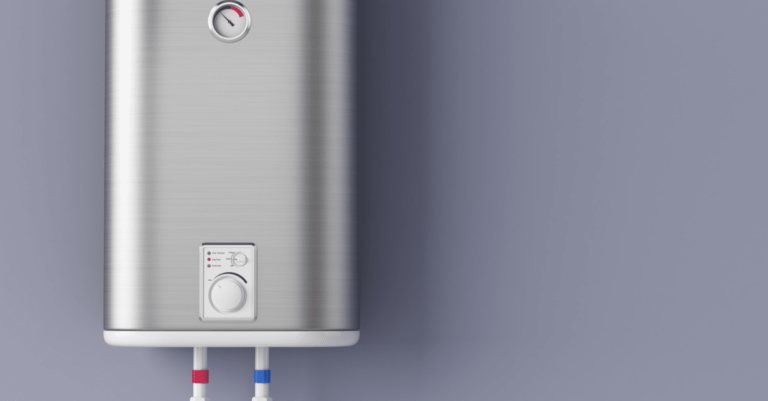Choosing the right water heater for your Denver Metro home is an important decision that affects your family’s comfort. No one wants to be doused with cold water while they’re enjoying a steamy shower! The ideal water heater will provide the right volume of hot water for all of your appliances while optimizing efficiency (and lowering your utility bill). According to the DOE’s Office of Energy Efficiency and Renewable Energy, water heating costs actually comprise 14% of a home’s overall expenses.
There are several types of water heaters to consider, including tankless. Tankless water heaters offer a multitude of benefits that make them attractive as an investment in your home. However, like anything, tankless water heaters don’t exist without some disadvantages too. With a decision that holds a significant impact on your wallet, it’s essential to weigh all the pros and cons before moving forward. Keep reading to make an informed decision that fits your household’s needs and budget!
The Cons of Tankless Water Heaters
1. Energy-Efficient
Tankless water heaters are more energy-efficient than traditional tank water heaters because there’s no tank to heat continually. Rather, tankless water heaters only heat water as it flows through the unit as needed, which means energy isn’t wasted on heating and storing unused water.
2. Lower Energy Bills
By only heating water when you need it versus keeping a tank of water heated constantly, you’ll use less energy overall. This can lead to significant cost savings on your energy bills over time. While tankless water heaters have a higher upfront cost than traditional tank-style heaters, the lower energy bills can make up for it in the long run.
3. Saves Space
Tankless water heaters are much smaller than traditional tank water heaters, and they can be mounted on a wall, freeing up valuable floor space. Smaller homes or homes with limited space can especially benefit from the added room compared to traditional bulky tank-style heaters. With tankless water heaters, you can reclaim and use that space for other purposes like storage of hobby equipment.
4. Longevity
Tankless water heaters have a longer lifespan than traditional tank-style heaters, with an average lifespan of 15 to 20 years compared to 10 to 15 years respectively. Not having to replace your water heater as frequently will save you a large expense and the time involved with installation.
5. Continuous Hot Water
Tankless water heaters can provide continuous hot water on demand, unlike traditional tank water heaters that can run out of hot water after a certain amount of usage. It makes the most significant difference for larger households or households that use a lot of hot water. With a tankless water heater, you’ll always have hot water when you need it without waiting for the tank to refill and reheat.
6. Reduced Risk of Water Damage
With a tankless water heater, there’s no risk of a tank leaking and causing water damage to your home. Water damage can be costly to repair and can cause significant damage to your home. A tankless water heater provides peace of mind that you won’t ever have to worry about a malfunctioning tank.
7. Easy Maintenance
It’s very simple for homeowners to perform maintenance on a tankless water heater themselves. Hard water causes mineral build-up, in which case a 20-minute vinegar flush will flush it all out and keep your water heater running in excellent condition.
The Cons of Tankless Water Heaters
1. Higher Upfront Purchase Cost
While tankless water heaters are more energy-efficient than traditional tank water heaters, they do come with a higher upfront cost. Tankless units can cost two to three times more than traditional tank-style heaters. However, the lower energy bills can compensate for the initial cost over time. According to the Department of Energy, the operating costs of a tankless water heater can be up to 50% less than a traditional tank-style heater.
2. Higher Installation Costs
Installing a tankless water heater can be more expensive than installing a traditional tank water heater, especially if you need to upgrade your home’s gas or electrical system. Tankless units typically require a larger electrical load than traditional units due to specialized venting and gas lines. The installation costs can vary depending on the complexity of the job and the materials needed, so it’s important to get an estimate from a qualified installer before making a decision.
3. Limited Flow Rate
Tankless water heaters have a limited flow rate, which means they may be unable to provide hot water to multiple fixtures simultaneously if the water heater isn’t sized correctly for your appliances. Larger households that need to use multiple hot water sources simultaneously, such as running the dishwasher while someone is taking a shower, may need to install multiple tankless units or a larger unit.Delayed Hot Water
4. Delayed Hot Water
It can take a few seconds for hot water to reach the faucet when using a tankless water heater. The water must travel through the pipes to reach the unit and be heated before it reaches the faucet, which can be inconvenient. Homeowners can minimize the delay by installing the water heater in a more centralized location or using a recirculation pump to keep hot water flowing through the pipes.
Tankless Water Heaters in the Denver Metro
Choosing the right water heater for your Denver Metro home is crucial for your family’s comfort and budget. Tankless water heaters offer many benefits that make them an attractive investment in your home, such as energy efficiency, lower utility bills, longevity, compactness, and a continual hot water supply. Plus, without a tank, maintenance is easy, and you don’t have to worry about water damage from a malfunctioning tank.
However, you’ll have to pay a higher upfront cost to take advantage of these benefits due to higher product prices and installation costs. Some other downsides are that you might not be able to run all of your hot water appliances simultaneously if the tankless unit isn’t equipped to handle that volume, and it might take a few seconds for the warm water to reach your faucet.
Ensure that you choose a water heater that works for your home’s hot water needs and operates efficiently. Call us at [theme_company_telephone] or message our team of home care experts to discuss your best water heater options today!


